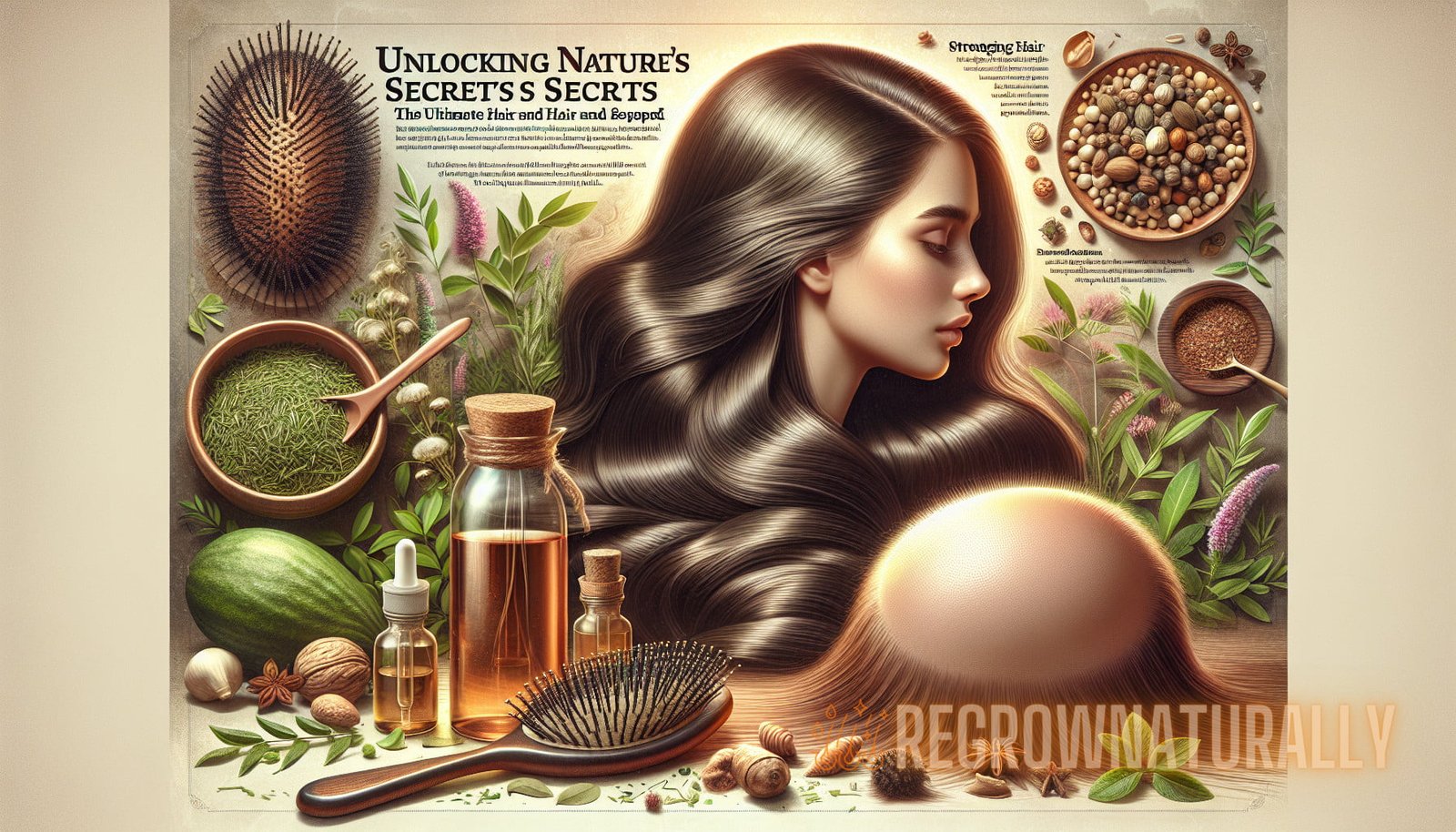Table of Contents
- Introduction
- The Basics of Hair Health
- Common Hair Problems
- Understanding Herbal Remedies
- Benefits of Herbal Remedies for Hair
- Top Herbs for Healthy Hair
- How to Use Herbal Remedies
- Other Tips for Healthy Hair
- Conclusion
Introduction
Having healthy hair is something many people desire. It not only enhances our appearance, but it often serves as an indicator of our overall health. However, with the constant exposure to harsh chemicals, heat styling, and environmental factors, maintaining healthy hair and a healthy scalp can be challenging. This is where herbal remedies come in. In this comprehensive guide, we’ll explore the science behind herbal remedies for healthy hair and scalp and uncover nature’s best-kept secrets.
The Basics of Hair Health
Before delving into herbal remedies, it’s important to understand the basics of hair health. The hair shaft consists of three layers – the cuticle, cortex, and medulla. The cuticle is the outermost layer, responsible for protecting the inner layers. The cortex contains the pigment that gives color to our hair, while the medulla is the central layer, providing structural support.
Healthy hair starts at the scalp. The scalp is the foundation for strong and vibrant hair growth. It is essential to keep the scalp clean, well-nourished, and free from any conditions that may hinder hair growth.
Common Hair Problems
There are various hair problems that individuals may experience, ranging from dryness and frizz to dandruff and hair loss. These issues can be caused by factors such as nutritional deficiencies, hormonal imbalances, genetic predisposition, stress, and lifestyle habits. Understanding the root causes of these problems is crucial in finding effective solutions.
One common hair problem is hair loss. Hair loss can be a result of genetics, hormonal changes, medical conditions, or a combination of factors. Herbal remedies can help promote hair growth by nourishing the hair follicles, increasing blood circulation to the scalp, and reducing inflammation.
Understanding Herbal Remedies
Herbal remedies have been used for centuries to address various health issues, including hair and scalp problems. These remedies involve the use of plants and plant extracts that are known for their beneficial properties. When it comes to hair health, herbs can provide essential nutrients, promote scalp health, and stimulate hair growth.
Herbs contain vitamins, minerals, proteins, and antioxidants that can nourish the scalp and hair follicles. Some herbs also have antibacterial, antifungal, and anti-inflammatory properties that can prevent scalp infections and reduce inflammation, which may contribute to hair loss.
It’s important to note that while herbal remedies can be effective, individual results may vary. It’s advisable to consult with a healthcare professional before starting any new treatment regimen, especially if you have any underlying health conditions or are taking medication.

Benefits of Herbal Remedies for Hair
Using herbal remedies for hair care offers numerous benefits:
- Promote hair growth: Certain herbs can stimulate hair follicles and promote the growth of new hair.
- Strengthen hair: Herbal remedies can strengthen the hair shaft, reducing breakage and split ends.
- Prevent scalp infections: Many herbs have antibacterial and antifungal properties that can protect the scalp from infections.
- Reduce inflammation: Inflammation can contribute to hair loss. Herbal remedies with anti-inflammatory properties can help manage this issue.
- Improve scalp health: Herbs can nourish the scalp, balance sebum production, and remove excess oil and dirt.
- Enhance shine and manageability: Some herbs can improve hair texture, making it shinier and more manageable.
By incorporating herbal remedies into your hair care routine, you can address specific hair concerns and maintain a healthy scalp, leading to stronger and more beautiful hair.
Top Herbs for Healthy Hair
There are several herbs that are particularly beneficial for promoting healthy hair and scalp. Let’s explore some of the top herbs used in herbal remedies:
Aloe Vera
Aloe vera is a versatile plant that has been used for centuries for its healing properties. It contains enzymes that promote hair growth, soothe the scalp, and reduce dandruff. Aloe vera also has a high content of vitamins and minerals, providing essential nutrients to the hair follicles. It can be applied topically as a gel or consumed internally as a juice.
Rosemary
Rosemary is a fragrant herb that stimulates hair follicles, promoting hair growth. It increases blood circulation to the scalp, which helps deliver nutrients to the hair follicles. Rosemary also has antimicrobial properties that can prevent scalp infections. It can be used as an oil, added to shampoos, or used as a rinse.
The hair renewal article provides detailed information on how to use rosemary and other herbs for hair growth.
Lavender
Lavender has a calming scent and is known for its soothing properties. It can reduce stress and promote relaxation, which can indirectly benefit hair health. Stress is a common cause of hair loss, so managing stress levels is crucial. Additionally, lavender oil can improve blood circulation to the scalp and reduce itchiness or dandruff.

Ginseng
Ginseng is an adaptogenic herb that can help regulate hormone levels. Hormonal imbalances can contribute to hair loss, so maintaining hormonal balance is essential for healthy hair growth. Ginseng also improves blood circulation, allowing nutrients to reach the hair follicles more efficiently. It can be taken as a supplement or used topically in hair products.
For more information on ginseng and its benefits for hair, read the hair renewal article.
Hibiscus
Hibiscus is a beautiful flower that is rich in vitamins, minerals, and antioxidants. It helps strengthen hair roots, prevent premature graying, and reduce hair fall. Hibiscus also acts as a natural conditioner, making the hair soft and shiny. It can be used as a hair mask, oil, or added to hair care products.
How to Use Herbal Remedies
Herbal remedies can be used in various forms depending on the herb and the desired results:
- Topical applications: Many herbs can be applied directly to the scalp or hair as oils, masks, or rinses. These can nourish the scalp, promote hair growth, and address specific issues like dandruff or dryness.
- Internal consumption: Some herbs can be consumed orally as supplements or added to teas. This allows the nutrients to reach the hair follicles from within, promoting overall hair health.
- Hair care products: Herbal ingredients can be found in shampoos, conditioners, serums, and other hair care products. Look for products that use natural and organic herbs to maximize their benefits.
It’s important to follow the instructions provided for each herbal remedy and to be consistent in their usage to achieve the desired results. It’s also essential to perform a patch test before using any new herbal remedy to ensure there are no adverse reactions.
Other Tips for Healthy Hair
In addition to using herbal remedies, there are several other tips you can follow to maintain healthy hair:
- Avoid excessive heat styling: Heat can damage the hair shaft and lead to breakage. Limit the use of heat styling tools such as flat irons and curling irons, and use a heat protectant product when necessary.
- Protect your hair from the sun: UV rays can cause dryness, frizz, and color fading. Wear a hat or use a sun protectant spray when spending time in the sun.
- Eat a balanced diet: Nutrition plays a vital role in hair health. Consume a diet rich in vitamins, minerals, and proteins to support strong and vibrant hair.
- Avoid harsh chemicals: Many hair care products contain harsh chemicals that can strip the hair of its natural oils and cause damage. Opt for gentle, natural products instead.
- Manage stress levels: Chronic stress can take a toll on hair health. Practice stress management techniques such as meditation, exercise, or therapy to reduce stress levels.
- Regularly trim your hair: Trimming the ends of your hair regularly can prevent split ends and breakage, keeping your hair looking healthy.
Conclusion
Uncovering nature’s best-kept secrets for healthy hair and scalp involves delving into the science behind herbal remedies. By understanding the basics of hair health, the common hair problems people face, and the benefits of herbal remedies, individuals can make informed decisions when it comes to their hair care routine. Incorporating herbs like aloe vera, rosemary, lavender, ginseng, and hibiscus can provide nourishment, stimulate hair growth, and improve scalp health. By following proper usage methods and incorporating other healthy hair practices, individuals can achieve healthier and more beautiful hair.



